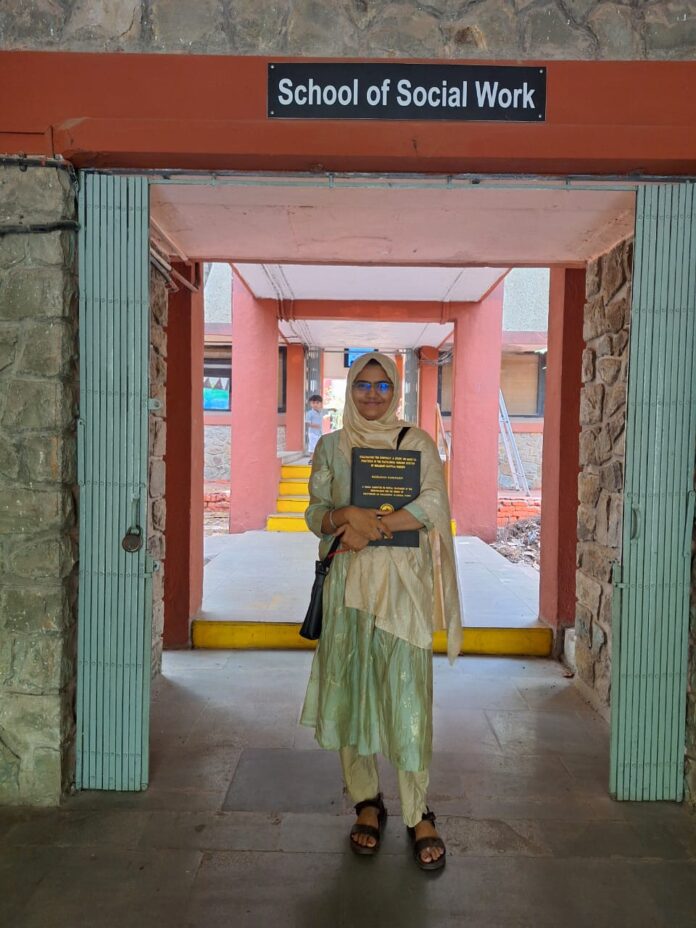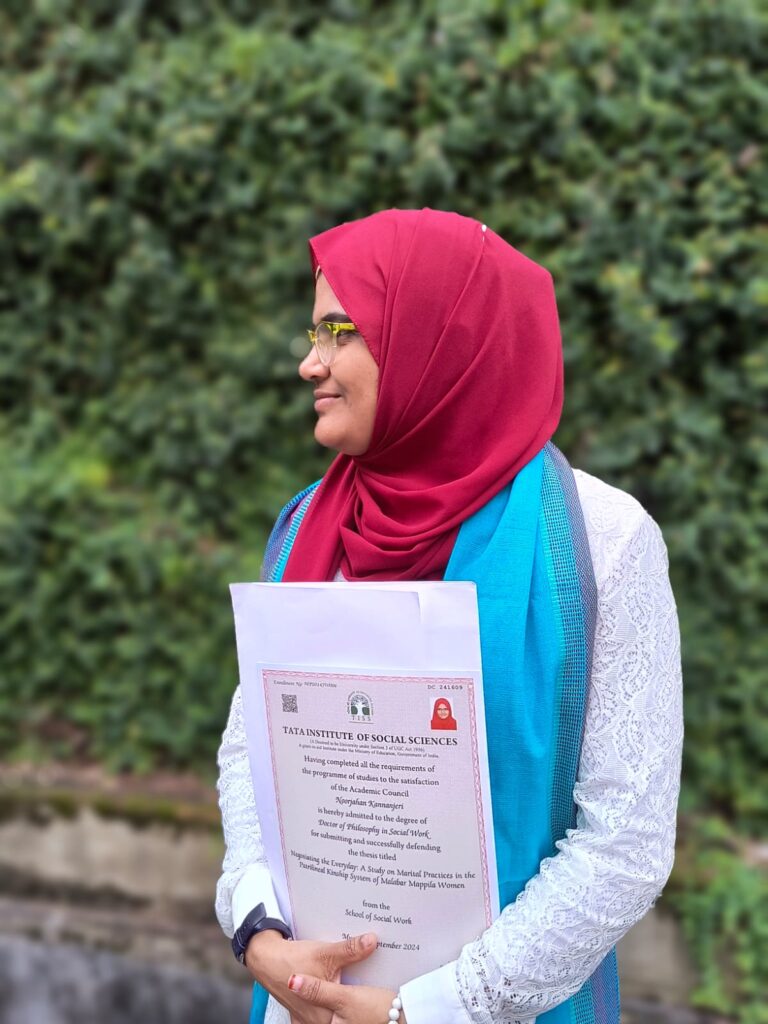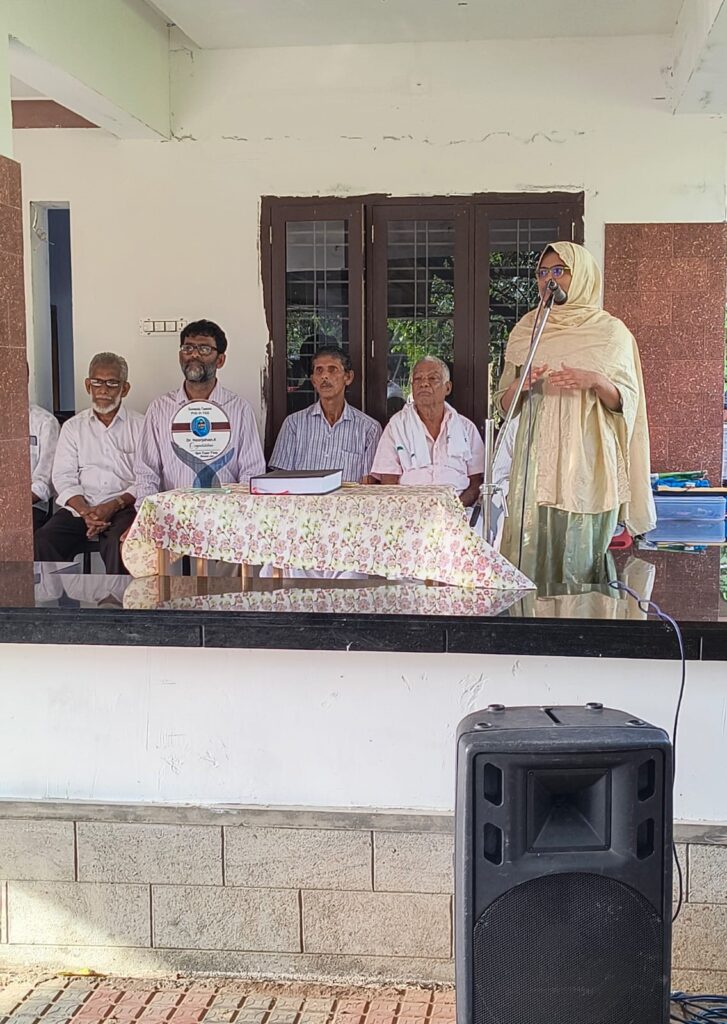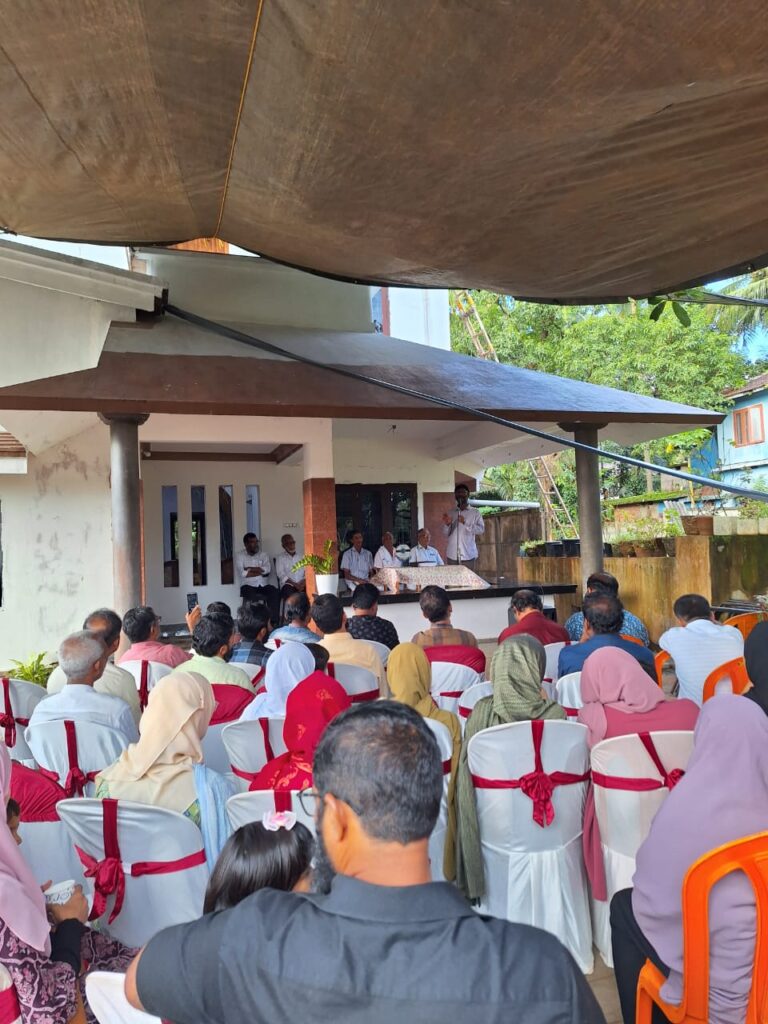Malappuram, KERALA :

Dr Noorjahan in TISS Mumbai
Kozhikode:
How do we celebrate our achievements, especially when it is an academic milestone? For many, it is posting a proud announcement on social media, celebrating with family and friends and sharing the moments with the world. But for Noorjahan, a 37-year-old woman from Malappuram, the celebration of her doctorate was a unique affair — one that blended tradition, personal triumph and community spirit in a way rarely seen. Instead of a quiet reflection or a typical party, she hosted what she called a ‘Ph.D. wedding’, erecting a grand pandal (a traditional tent used for large gatherings) outside her home and inviting close family, friends and those who had supported her journey.
She wanted to highlight the significance of the occasion in a way that went beyond the usual. “Why not celebrate an academic achievement like we celebrate a wedding, the arrival of a child or a baby’s first haircut?” she asked, reflecting on the importance of her journey.
Noorjahan invited not just her friends, but also those who had been part of her research or who had supported her along the way. “We always focus on the results, but we do not often talk about the process that leads to them,” she told TwoCircles.net. Her aim was to open a conversation about that very process —the often-overlooked work behind the doctorate.
Despite her active presence on social media, she chose not to post about the event herself. Instead, the world learned about her unconventional celebration through the posts of her friends and well-wishers. It was one of these posts that led to the term “Ph.D. wedding”, coined by writer and social critic Emmar Kinalur, who attended the event. In his Facebook post, Kinalur recalled the loud applause that followed when Noorjahan spoke about her journey, particularly from the women and girls in the audience.

Dr Noorjahan with her PhD thesis
The Everyday Lives of Malabar’s Muslim Women
For Noorjahan, the uniqueness of her celebration mirrored the unconventional nature of her research. Her thesis, titled Negotiating the Everyday: A Study on Marital Practices in the Patrilineal Kinship System of Malabar Mappila Women, delves deep into the lives of Muslim women in the Malabar region of Kerala. What inspired her to choose this topic? For Noorjahan, the subject was deeply personal and autobiographical.
When she began her Ph.D. journey in 2014, the societal discourse was dominated by debates over reducing the marriageable age of Muslim girls to 16. This reminded her of the negotiations she herself had to make to pursue higher education. “I had to convince people at every stage of my life — why I was doing a Ph.D.; why I was going to Mumbai; and whether it would delay having children,” Noorjahan explained.
The decision to pursue her research at the Tata Institute of Social Sciences (TISS) in Mumbai was also a negotiation, as the institution offered an off-campus option for those with an M.Phil. She was one of many women balancing education, work and family, all while negotiating the pressures of everyday life.
Noorjahan’s research journey was not an easy one. It took her a decade to complete, during which she juggled the demands of raising two children, teaching in colleges, working as a psychiatric social worker, co-authoring a book on a prominent Kerala journalist and contributing to social media and magazines. “This process has elevated my perspectives beyond skill development and knowledge growth,” she wrote on her Facebook wall. “Looking through that lens, this was also an evolutionary process; and I am proud of it.”
Guardianship and Widowhood
When asked about the most significant findings from her research, Noorjahan pointed to two key aspects: guardianship and widowhood. These issues, though long present in society, took on new meanings in the context of her work. She explored the concept of wali (guardian) in Islamic law, a role typically filled by a father or brother, but in the absence of a male guardian, a qazi or judge assumes this position during the wedding ceremony. However, Noorjahan highlighted how, in practice, this system often lacks real responsibility, and the role of the guardian is reduced to a ceremonial one.

Dr Noorjahan speaking at the ‘PhD wedding’ function held at her home
Equally important in her research was the issue of widowhood. Noorjahan pointed out that the traditional practices surrounding widowhood in the Malabar region have been influenced by Brahminical patriarchal systems, despite Islamic principles that allow widows the freedom to decide their future once the iddah (waiting) period is over. Instead of offering this autonomy, society often seeks to rehabilitate widows within the same patrilineal framework, framing their inclusion as a virtuous act of charity. “While we call it charity or virtuous deeds, it is women who suffer under this framework,” she argued.
The Support of Women in Her Life
Throughout her academic journey, Noorjahan found steadfast support in the women around her, particularly her mother, Saleemath V – a retired teacher from their hometown in Areekode. Saleemath was a constant presence, travelling with her daughter to Mumbai, caring for the children when Noorjahan was busy and offering her moral and emotional support. “My mother was also learning and changing in her own way, just as I was evolving through my education,” Noorjahan said, underscoring the importance of familial support for women pursuing careers or higher education after marriage and children.
Saleemath herself reflected on her daughter’s resilience, saying it was Noorjahan’s determination and steadfastness that had enabled her to complete her Ph.D. despite the many challenges, including the demands of family life. “Many women give up halfway, but Noorjahan did not,” she proudly noted.

The ‘PhD wedding’ function at the home of Dr Noorjahan
Empowering Women
Now, Dr. Noorjahan works as the head of the Department for the Child and Women Resilience Project at Thanal – an NGO in Kozhikode run by the Daya Charitable Trust. The project aims to improve the lives of widowed, deserted, divorced or separated women and their children in the Wayanad and Kannur districts of Kerala.
Noorjahan’s work continues to reflect her dedication to empowering women and advocating for their rights, a theme that runs through both her academic research and her professional life.
Through her unique “Ph.D. wedding” and her groundbreaking research, Dr. Noorjahan has not only celebrated her own academic achievement but also sparked a wider conversation about the roles of women – especially in the context of the Malabar Muslim community. Her work, her resilience and her commitment to her community continue to inspire those around her — especially the women whose lives she seeks to improve.
source: http://www.twocircles.net / TwoCircles.net / Home> India News / by Najiya O, TwoCircles.net / November 17th, 2024








